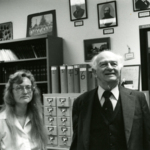Interviewer: Ilona Fry
Interview Date: May 20, 1980
Location: Oregon State University, Corvallis, Oregon
Duration: 1:31:12
In this interview with Ilona Fry of the Oregon State University Archives, Linus Pauling begins by describing his childhood in Oregon. Pauling recalls being interested in science from quite a young age and notes that his earliest scientific interests were entomology and geology. After high school, Pauling attended Oregon State University, then called Oregon Agricultural College, where he studied chemical engineering. He describes his favorite subjects and professors at OAC and notes that he worked in the chemistry department throughout his college years. Pauling also talks about meeting his wife while in college and his impression of William Jasper Kerr, then president of OAC.
The interview then turns to Pauling’s experiences in graduate school at Caltech. He explains that he had a wide variety of interests while in graduate school and that his early post-doc research focused on quantum mechanics and statistical mechanics. After becoming a professor, he began to research chemical bonds. He continued his research on chemical bonds for decades and states that he never lost interest in the subject.
From there, the interview shifts to Pauling’s political views and activities in the wake of World War II. Pauling objected to many of the attitudes held during the McCarthy era and held anti-war beliefs. He was also opposed to the development and use of atomic weapons. Pauling elaborates on what he believes the United States should do with its nuclear stockpile and criticizes the amount of national spending devoted to the military.
Finally, Pauling describes his interest in biology and medicine. He discusses the uses of Vitamin C in medicine and describes a book he co-authored on Vitamin C as a treatment for cancer. He states that most physicians who have talked to him have supported his ideas. The interview concludes with Pauling’s brief reflections on how OSU has changed.
Dublin Core
Title
Description
The interview then turns to Pauling’s experiences in graduate school at Caltech. He explains that he had a wide variety of interests while in graduate school and that his early post-doc research focused on quantum mechanics and statistical mechanics. After becoming a professor, he began to research chemical bonds. He continued his research on chemical bonds for decades and states that he never lost interest in the subject.
From there, the interview shifts to Pauling’s political views and activities in the wake of World War II. Pauling objected to many of the attitudes held during the McCarthy era and held anti-war beliefs. He was also opposed to the development and use of atomic weapons. Pauling elaborates on what he believes the United States should do with its nuclear stockpile and criticizes the amount of national spending devoted to the military.
Finally, Pauling describes his interest in biology and medicine. He discusses the uses of Vitamin C in medicine and describes a book he co-authored on Vitamin C as a treatment for cancer. He states that most physicians who have talked to him have supported his ideas. The interview concludes with Pauling’s brief reflections on how OSU has changed.

